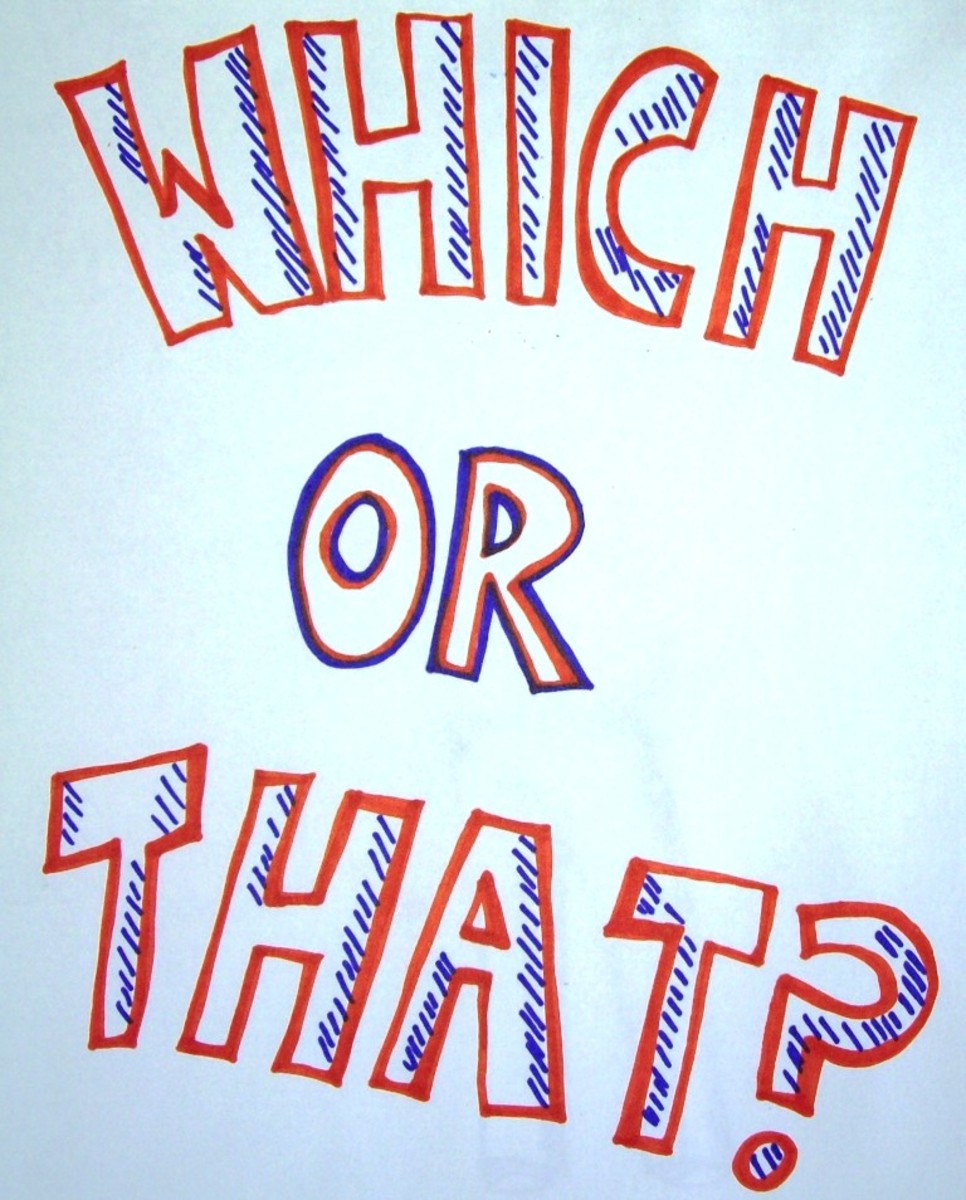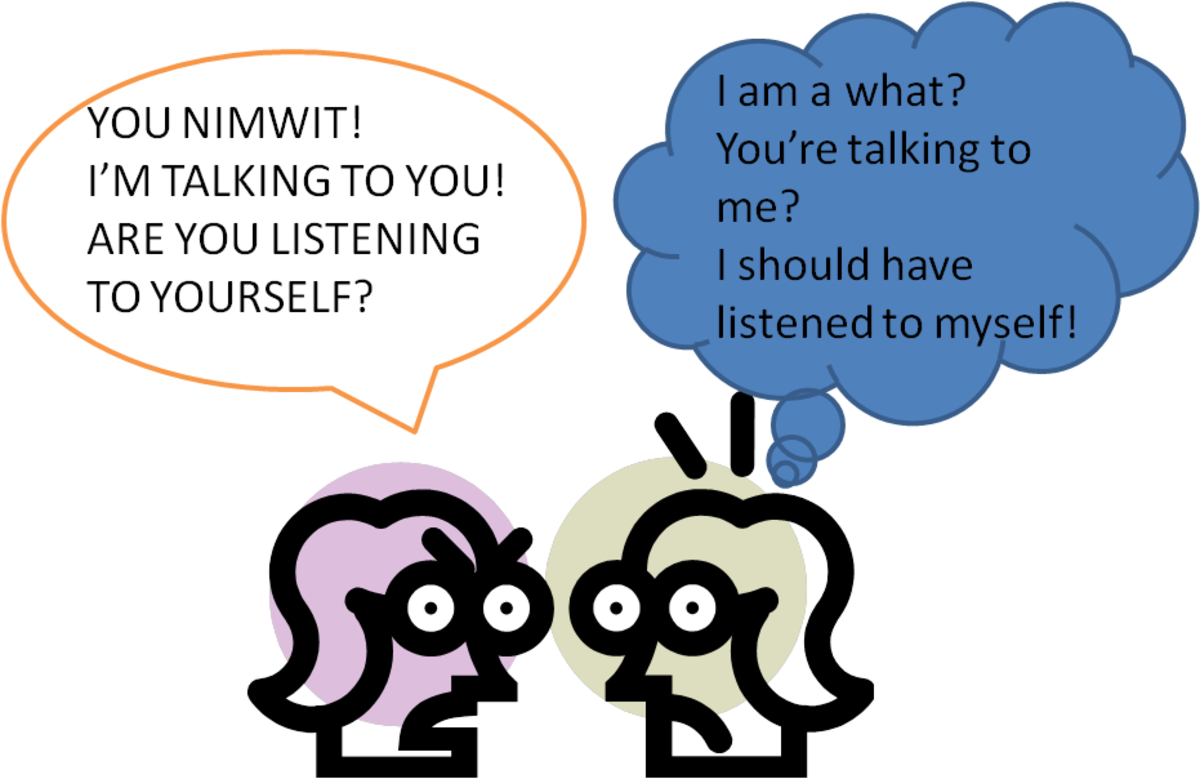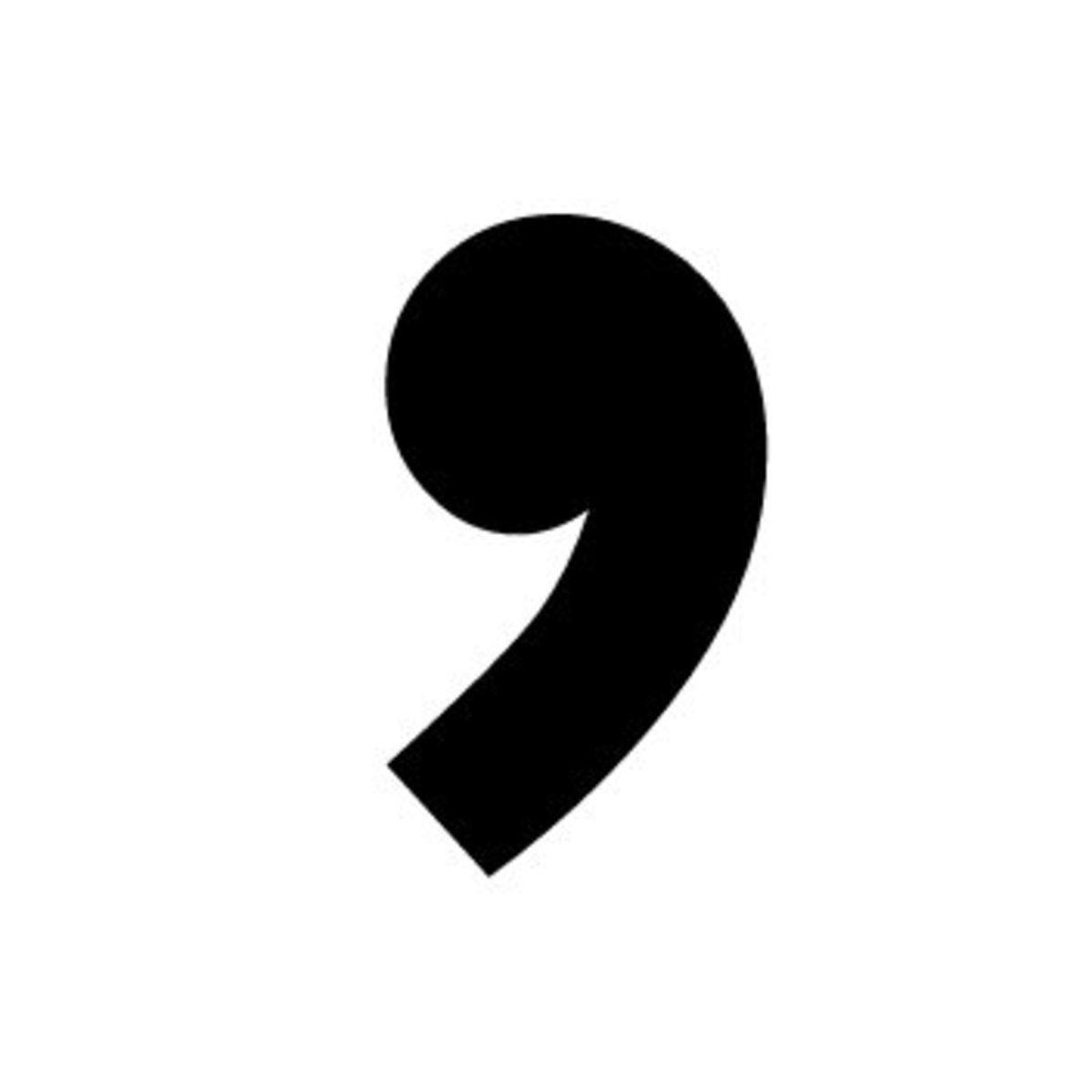Five Wrong Word English Grammar Mistakes Web Content Writers Must Avoid
Avoid Wrong Word Grammar Mistakes When Writing Web Content

If You Are an English (United States) Web Content Writer, Then You Should Be Compelled to Write It Right.
To be honest, “Write it correctly” may have been a better sub-heading title for this paragraph; however, “right” is still correct. I point this out to bring up the matter that most web content readers are not bothered by the choice of words web content writers choose to use in conveying their message, however, web content writers who have grammar mistakes in their web content may be looked upon as less credible as a writer.
I stress United States (U. S.) because I am from the United States and write for U. S. English publishing companies. So, everything I publish is specifically published for the U. S. Naturally, other countries have their own personal standard. The information I share in this article is specifically geared for writers and readers of U. S. web content publications.
Web Content Writers Are Urged to Correct Grammar Mistakes
I speak from a reader’s point of view when I say that I am not bothered by imperfections in sentence structure. I understand that the web is an international platform and many of the writers on the internet do not have English as their primary language. Web content writers serve a global community. Consequently, readers come from all corners of the earth with their own individual understanding of words, per se. It is humanely acceptable to see imperfections in some of the web content that they read on the internet. Readers are forgivable on that matter. However, as a reader, my greatest contention is when web content writers have grammar mistakes in their web content.
Grammar Mistakes
Grammar mistakes can make it difficult for readers who do not have a full command of the English language, or do not have English as a primary language. Try to remember back in school when you were trying to learn a new language. Each word had a meaning. So, for instance, if you were trying to learn what the contraction of “you are” was and you saw the word “your” erroneously placed in a sentence instead of “you’re”, you would have a difficult time deciphering the meaning of the word. The same thing happens when readers who read your web content see grammar mistakes while reading your web content. When you make grammar mistakes, you are forcing the reader to re-read your content to grasp the meaning of your content.
Chicago Manual of Style
When I was a technical writer and editor for the computer industry, I kept the Chicago Manual of Style at my desk. The Chicago Manual of Style is the most widely acceptable standard for English grammar style for all industries across the board. Of course, styles change over the course of time. Fortunately, the Chicago Manual of Style is updated on a regular basis. If you are a web content writer, you would be doing yourself a favor by keeping the most recent version of this manual handy at all times..
Your Web Content Must Be Good Enough to Keep the Reader Interested
The internet is filled with information vying for your readers’ attention, so if you want to keep your readers engaged with your content, you need to be able to convey your information quickly and correctly, lest your visitor will click off of your web content just as soon as they clicked on to it. Think of grammar mistakes as a huge injustice to your readers and, possibly a lost customer or client.
Wrong Word Grammar Mistakes
Wrong word grammar mistakes come in many varieties. They can be among the hardest errors to check for, because you may not be able to see what’s wrong. Normally, the wrong word mistake is due to using the improper use of homonyms (words that are pronounced alike but spelled differently).
I encourage web content writers to look at your web content to see where your wrong word grammar mistakes are and then correct them so that your web content is not filled with grammar mistakes.
Web Content Writers Remember – You Are Writers!
If you are a web content writer, remember plainly and simply, you are a writer. It doesn’t matter how much you get paid or not paid for the content you write, what is important is that when you write, you are a writer and you are responsible for writing worthy web content. As a writer, you are scrutinized, evaluated, and referred to for correct grammar and style. Your choice of words is subjective, meaning, it is up to you to choose the best word to convey your thoughts or content; however, when you make grammar mistakes, you make it difficult for readers to understand what you have written, hence, diminishing your credibility as a web content writer.
Think about it. You are a writer! If you can’t write it right, then who can?
See the list of the most common wrong word grammar mistakes web content writers make. Then, where you have these common grammar mistakes, work to correct your mistakes. It is sure to boost your credibility as a web content writer.
Helpful Grammar Hints - You - Your - You're
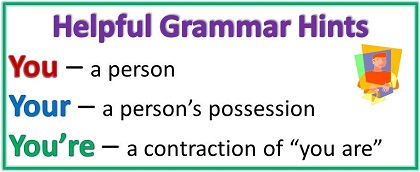
1. You /Your/ You’re Mistake
The word “you” is the easiest mistake to correct. Your “spell checker” tool won’t find it, because in this case, it is not a matter of spelling, it is a matter of grammar. I think most writers know that you refers to a subject, yet when web content writers fail to re-read their web content prior to publishing, they fail to discover this wrong word error.
Your spell checker is not going to find a grammatical mistake in a sentence such as, "Thank you for you email.” The second word you is spelled correctly, however, the use of the word you, in this case, is incorrect. In the example shown in the above sentence, the sentence should have been written, "Thank you for your email." You just need to read through your document to discover this type of common grammatical error.
Another error I see is when people use the word “your” when they should use the contraction “you’re". The word your is a possessive pronoun and refers to something that a person possesses. This is another case where your spell checker tool will not flag the word as incorrect, because, the word is spelled correctly, however, the word is used incorrectly.
Write “you’re” when you mean “you are”. Write “your” when you are making a reference to someone’s possession.
Examples of how to use the words you, your, you are, and you're.
- Thank you.
- This is your purse.
- You’re welcome. You are a wonderful person.
Helpful Grammar Hints - Than - Then

2. Than/Then Mistake
Use the word than when you want to compare something.
Examples of how to use the word than:
- This show is better than that show.
- This flower is prettier than that flower.
Use the word then in the following ways:
Examples of how to use the word then:
A point in time:
- Since the show is tomorrow, I’ll see you then.
A sequence of events or order of things in a sequence:
- I’m going to go see the show, then I’m going to bed.
As a substitute for the word “also” or “in addition”:
- I brought enough money for the show, then I remembered I’d want to have popcorn, too.
A statement of case, such as to say, “In that case.”:
- If you don’t want to go to the show, then don’t.
Also, use then when you mean to say, “At the same time.” Or, “On the other hand…”:
- I want to go to the show, but then I don’t like sitting in a dark theater.
To make it easier on you, all you really need to do to remember when to use than. This is my little secret. The simple rule for than is that it is used to compare items. So, if your sentence is not referring to a comparison, for example, greater than, less than, heavier than, better than, and so on, then you would use the word then. I hope this little secret is helpful
Helpful Grammar Hints - Its - It's
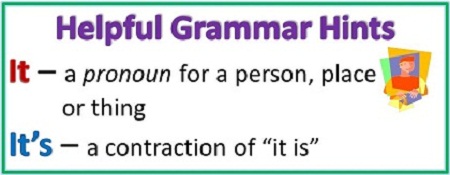
3. Its/It’s Mistake
I see this mistake a lot. Believe me; I have made my share of mistakes with these words, too. It’s not that I don’t know the rules, I just need to be more conscientious to stop and analyze the sentence and determine to what I am referring. For example, the word its is a possessive pronoun. So, just like the word your, only use this word when you are referring to someone or something that is possessed.
The word it’s is a contraction of the words “it is”.
Examples of how to use the words its and it's.
- The lion licked its paws.
- It’s easy when its paws are right there in front of him.
Helpful Grammar Hints - Their - There - They're
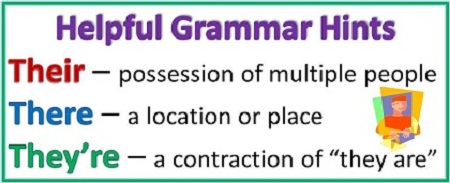
4. Their/There/They’re Mistake
The word their is another possessive pronoun.
The word there refers to a location or place. You also want to use the word there with the words be, am, are, was, and were.
The word they’re is a contraction of the words they are.
Examples of how to use the words their, there, and they’re:
- They cannot seem to find their ticket to the show.
- I see there are others who cannot find their tickets, either.
- If that’s the case, they’re not going to be able to get into the show.
Helpful Grammar Hints - A lot - Alot

5. A lot vs. Alot Mistake
First of all, “alot” is not even a real word. So, don’t ever use it in any sentence. Use “a lot” to refer to something that is “plenty”.
Examples of how to use the words a lot (never use "alot"):
- There are a lot of lessons to be learned.
- I have been to the show a lot of times.
No One is Perfect!
I don’t profess to be perfect, and I don’t expect other writers to be perfect, but there are some grammar mistakes that are so blatant they should not be overlooked by decent writers.
It is difficult to critique your own work, but if you are a web content writer, then it is critical that you make a diligent effort to read and re-read your work as much as possible. Comb through each sentence more than one time to determine if you have made a grammar mistake. Read through the material slowly. Try to find grammar mistakes, and when you find a grammar mistake, correct it immediately.
Writers Are Human, But Writers Are Held to a Higher Standard
Lastly, remember that you are human. You will make mistakes. The key is to work harder to keep grammar mistakes from ending up in your published web content. Try to remember the rules, and continue to read your published web content periodically to make sure errors did not pass through your diligent eye.
Readers will rate your web content on how easy it was to follow. And, even though they may not be an English scholar, they know when you make a mistake. It just sounds wrong the moment they read it. It is at that moment you are judged on your ability and credibility as a writer. If readers cannot trust your command of the English language, then ask yourself, “Can the reader trust the information contained in the content?”
Write Well and Write Often
Write well, my friends, and write often. The more you write, the better you write. For web content writers, there is nothing more rewarding than publishing words that have been put together for the enjoyment of others. I hope these tips are helpful and that you will use them to help you write web content that is appreciated by your readers.

